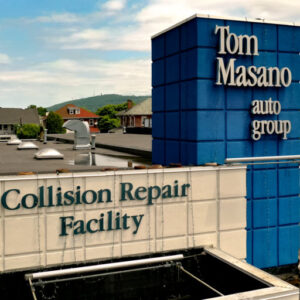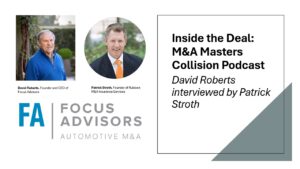Conflicting Forces Continue Impacting the Collision Repair Industry
In 1878, Charles Dickens published a novel called A Tale of Two Cities. The most famous quote from that novel was, “It was the best of times: it was the worst of times.”
The same is true today in the collision repair industry. While repair demand has never been higher for most well positioned providers, technician shortages have never been worse. Parts costs are rising rapidly and cycle times are growing longer. Revenues and profits have been slow to recover for most collision repairers – whether large or small.
On the other hand, for those MSOs and successful single shop operators leaving the industry, the number of buyers and the prices being paid have seldom been higher. The decision to leave has been made easier by aggressive acquisitions by large national and regional MSOs.
Headwinds – Boyd Services Group Third Quarter Results
Boyd Services Group results for Q3 2021 reflect the significant headwinds facing the industry. With net margins down significantly, Gerber publicly acknowledged three significant impacts on their business:
- Technician shortages didn’t allow them to produce all the work that was available to them.
- Parts cost increases and availability delayed a significant number of repairs.
- The higher proportion of parts vs labor for many repairs decreased gross profits.
Tailwinds – Boyd Services Group Acquisitions
At the same time, Boyd reported robust acquisition activity with more than 85 additions year-to-date versus only 30 in the same period of 2020. These included 51 in two large acquisitions – Collision Works in Oklahoma and John Harris Body Shops in South Carolina. Margin compression didn’t slow down growth by acquisition.
Accelerated decline of smaller shops
For some smaller shops, the pandemic’s reduction in repair volume along with declining margins finally pushed operators to sell or close. These shop were characterized by few or no DRPs and whose local marketing programs didn’t produce a full return of repair volumes. Consequently, the stronger operators in those local markets gained an advantage and increased market share, allowing them to approach full capacity – or at least their available tech capacity.
Headwinds are hitting almost everyone in the industry.
The most significant headwind across the industry is the technician shortage. Every shop in the industry from small single shops to the largest consolidators are constrained by an inadequate supply of trained technicians. Fewer techs means lower overall revenues. Consider that an average technician can generate $600,000 a year in repairs, the estimated nationwide shortage of 3,000 to 5,000 technicians translates into $2 to $3 billion of unprocessed repair work.
What has been a big concern for many years is reaching crisis proportions today. The pool of existing technicians is declining while the average age is increasing because new, younger technicians entering the business are fewer than those departing. Everyone from big consolidators to local MSOs are using everything in their tool chest to increase the supply. Paying bonuses to steal techs from competitors has reached its limits. Recruiting from high-cost cities to lower cost areas continues to increase. But the most expensive and longest lead time method is growing techs internally – finding strong recruits, investing in training, retention and attractive pay plans and working conditions.
As operators are pressed to increase compensation for techs, insurance company reimbursements for labor have not kept pace with this significant inflation. But the inflation in comp isn’t just with tech compensation. Lower wage personnel are asking for more comp and getting it! When McDonald’s is paying $17-20/hour in a market, recruiting entry level service personnel is more expensive and the compensation increases flow up the entire employment ladder.
Smaller shops and MSOs continue to ask for, even plead for rate increases. While watching windfall profits accrue to insurers during the pandemic, there has been a generalized expectation that insurers would finally grant some relief. But while in some markets there have been modest concessions, overall it appears that there is no broad change. When the large consolidators and MSOs start pushing for higher rates (or in some cases, lesser discounts and penalties), these headwinds may diminish.
At the same time, many insurers are continuing to slow-walk reimbursements for OE-required scans and other required procedures. As complexity increases and OE procedures become more dauntingly demanding, shops must invest more in specialized equipment and training to adequately comply. These increases in training and equipment costs are expected to continue as new models with new features and new construction techniques raise the technology bar.
CCC recently reported that parts costs are rising rapidly, partly a result of limited availability as well as pure inflation. Increases in cost of repairs helps drive total losses which, not surprisingly are increasing in 2021.
Tailwinds for Sellers
While every provider is facing similar headwinds, there are favorable tailwinds for selected operators. Consolidators and regional MSOs are continuing to grow aggressively. MSOs and single shop transactions are up significantly in 2021 over 2020 and 2019 levels. There have been huge deals like the sales of ProCare to Classic Collision and Collision Works mentioned above, as well as many smaller MSOs and single shop deals. Sellers are having a banner year, many of them receiving values well in excess of their expectations. This has been the result of more competitive bidding for attractive MSOs.
In years past, transactions have been driven by the big guys – Caliber, ABRA (since acquired by Caliber), Service King and Boyd/Gerber. In the last two years, four new private equity-sponsored MSOs have created robust acquisition programs. Private equity-backed Crash Champions has grown from six shops to more than 140 while Classic Collision, recapitalized by New Mountain Capital, has grown to more than 160 shops. New entrants Quality Collision and CollisionRight are also aggressively growing their footprints. Driven Brands, which previously focused on franchise operations including Carstar, Fix Auto, MAACO and the ABRA franchise network, has begun acquiring large MSOs while a recapitalized Joe Hudson continues to grow steadily.
With more than a dozen other regional and multi-regional MSOs also in the hunt for acquisitions, it has become more of a seller’s market, a situation that may persist well into 2022 and 2023. Many of the private equity sponsors committing capital to the collision repair sector may have expectations that an eventual Caliber public offering at a high EBITDA multiple will increase the value of their investments in rapidly growing MSOs. There is no indication of any imminent filing by Caliber to go public. But that doesn’t seem to have blunted the appetite of these new entrants.
With transactions at a very rapid pace in 2021, sellers have enjoyed robust consideration, especially those with market dominant positions, robust margins and healthy DRP relationships. The number of MSO sale transactions by year end will nearly double those of 2020 and may even exceed the total for 2019.
A Final Observation
It may be important to recall the remainder of the quote from Charles Dickens: ”It was the age of wisdom, it was the age of foolishness, it was the epoch of belief, it was the epoch of incredulity, it was the season of light, it was the season of darkness, it was the spring of hope, it was the winter of despair.”
- Wisdom and foolishness? Among the buyers and the sellers, who are the wise ones and who are the fools?
- Belief and incredulity? Will the continued enthusiasm for rapid growth prevail over the skepticism of past missteps?
- The spring of hope and the winter of despair? Will this winter of challenges yield to a new spring of improving margins, a larger supply of technicians and higher door rates from insurers?
Dickens didn’t offer conclusions; he merely described the conditions of a rapidly changing world and the disparate outcomes for the haves and have nots. Equally true in today’s collision repair industry as well.
About FOCUS Advisors and David Roberts:
FOCUS Advisors (focusadvisors.com) is a full-service FINRA-registered M&A advisory firm serving collision industry entrepreneurs looking for advice about growth and sale options, representing them in raising capital or selling their businesses. With more than 25 collision industry transactions in the last 6 years including recent sales of large MSOs such as Pride Auto Body, FixAuto USA and Auto Center Auto Body in Southern California, Price’s Collision in Nashville and Herb’s Body and Paint in Dallas, David Roberts is the industry’s leading advisor to MSOs and single shops. As the co-founder, Chairman and Chief Development Officer, he helped Caliber raise more than $120 million in capital and acquire 37 shops before its sale in 2008.
Investment banking and securities offered through Independent Investment Bankers, member SIPC/FINRA. Focus Advisors and Independent Investment Bankers are not affiliated.






